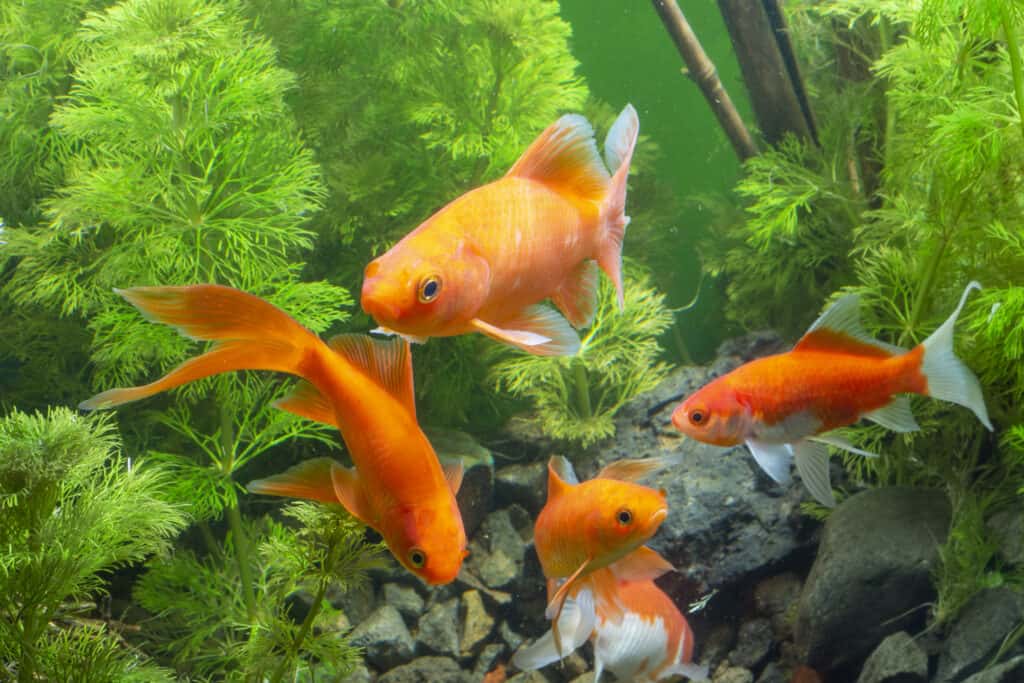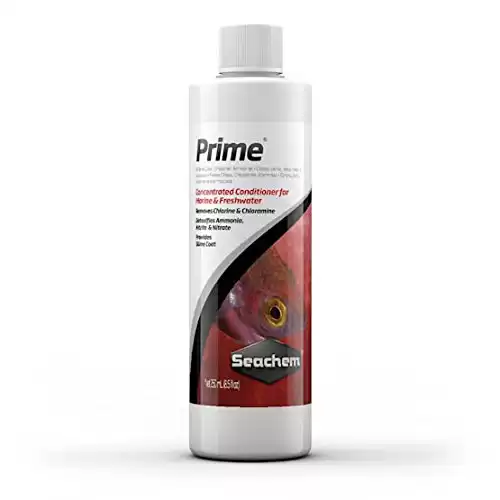Goldfish are normally one of the greediest of all pet fish, so it’ll always be concerning if they completely refuse to eat.
A lack of appetite in your goldfish is a classic tell-tale sign of a serious problem in your tank environment or your goldfish’s health that’ll need correcting as soon as possible. In many cases, it could save your goldfish’s life.
Let’s take a look at some of the most frequent problems that cause appetite loss in goldfish, followed by the best ways to remedy them.
Poor Water Quality
The number one cause for goldfish not eating is poor water quality.
Even if other secondary factors are involved, the root cause of most health problems in your goldfish is connected with unclean water in the fish tank or some sort of toxin that is making them feel unwell.
Let’s take a closer look at some of those:
Ammonia Poisoning
In an aquarium, fish waste, uneaten food, and rotting algae or plant material all produce ammonia. Since it is highly toxic to fish, if ammonia levels get too high, they could suffer ammonia poisoning.
Symptoms of ammonia poisoning include red or bleeding gills, rapid breathing or gasping for air, and loss of appetite.
Oxygen Deprivation – Hypoxia
When goldfish are kept in unsanitary conditions without adequate filtration or water changes, the dissolved oxygen levels in the aquarium can get very low, causing your goldfish to breathe more quickly, gasp for air, become lethargic, and refuse food.
Other Toxins – Chlorine and Soap
Goldfish are the number one choice of fish for new fish keepers, so it’s not surprising that they’re often the victim of beginner’s mistakes!
All fish are highly intolerant of chlorine and soap, meaning that if you add tap water to your aquarium without treating it or use even a tiny bit of soap or detergent to clean your fish tank, you could poison your fish and cause them serious health problems, and even death.
Refusing food is often one of the first symptoms of a fish that’s suffering from contaminated water.
Stress and Shock
When your goldfish is feeling stressed, it may refuse to eat. Stress and shock are often brought on by poor water quality, but there can be several other factors too:
Fish Tank Size Too Small
Some people don’t realize, but goldfish can grow to grand sizes! Did you know the largest goldfish recorded in captivity was a monstrous 19 inches long? So while baby goldfish can be kept in a 20-gallon aquarium, a 55-gallon or 75-gallon tank will be needed if they exceed 6 inches in length.
Small fish tanks are much more prone to water quality problems and could lead to your goldfish feeling cramped and unhappy. To find out why goldfish should never be kept in bowls, check out our dedicated article here.
Incompatible Tank Mates and Bullying
If you wish to keep other fish with your goldfish, you need to choose carefully. Goldfish tank mates need to be peaceful, and well-adapted to the lower temperatures and less pristine water conditions that are often found in goldfish tanks.
While some people have tried keeping fish such as rosy barbs and Chinese algae eaters with their goldfish, I wouldn’t recommend either of them. These types of fish can nip fins and even suck the slime coat off your goldfish, both of which could cause severe stress and even serious injury to your goldfish.
Incorrect Lighting
Just like you, your pet fish needs both day and night. While some novice aquarists may think it’s ok to leave the tank lights on for the whole night, it will cause your goldfish an enormous amount of stress. Likewise, your fish should never be left in the dark all day either.
If you’re not always around to turn your aquarium lights on and off, consider investing in a time switch, so that your goldfish receives 12-13 hours of light per day.
Incorrect or Unstable Temperature
Goldfish are coldwater fish and do best at temperatures between 67-72°F. They can therefore be kept in an unheated fish tank in a relatively warm room.
If your goldfish tank becomes colder than this, your fish’s metabolism will slow down, and it may well eat less food. This is a natural adaptation and won’t normally cause health problems, but your goldfish will likely become less active and require less feeding.
If you try to keep goldfish in a heated tropical fish tank, they may become stressed, leading to a loss of appetite.
Often more serious than incorrect temperature, however, is water temperature that fluctuates too rapidly. This can be especially problematic in small fish tanks where there is less water volume to buffer changes in the external temperature.
Sudden swings in temperature could result in your goldfish suffering from thermal shock, with loss of appetite being one the mildest symptoms – it can also be fatal.
Goldfish Diseases
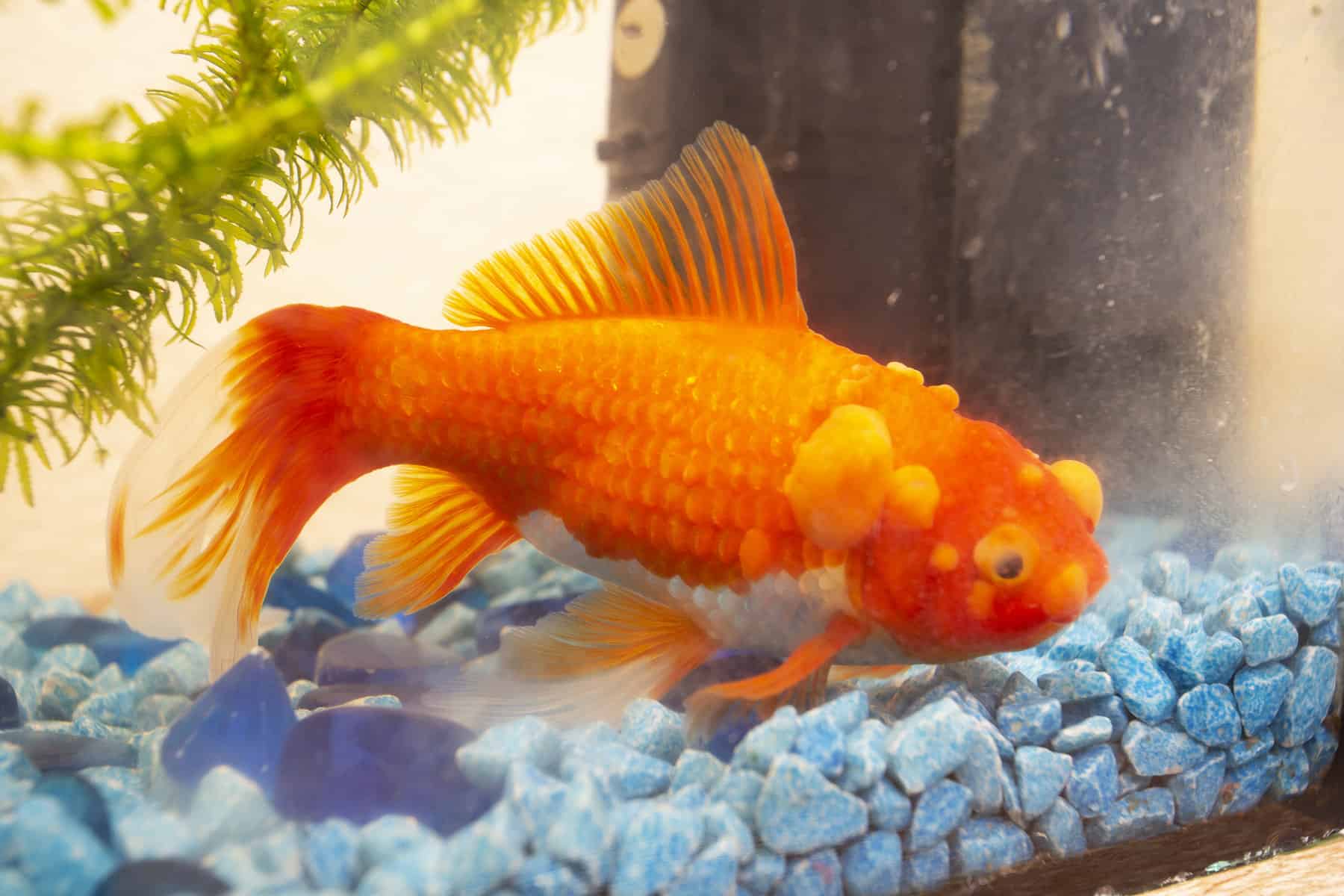
Just like other fish, goldfish are susceptible to an array of infectious diseases such as ich, velvet, fin rot, dropsy, parasitic worms, and bacterial infections.
Just as you might not feel like eating when you’re under the weather, contracting an infection is a very common reason for goldfish to lose their appetite.
Apart from infectious diseases, other health problems can cause a lack of appetite too. Swim Bladder disorder is one of the most frequent diseases in goldfish, and is often caused by overfeeding.
Ironically, overfeeding is one of the biggest causes of poor water quality and diseases in goldfish, which eventually leads to them refusing food!
Your Goldfish Don’t Like Their Fish Food!
Although goldfish are renowned for being greedy and will usually eat anything they are given, there may be some rare occasions when they might refuse to eat certain types of food.
All fish foods have an expiry date, and if you were to feed your goldfish old, rancid food, they might well refuse to eat it. If your goldfish has a mild health complaint, that may alter their feeding preferences slightly, too.
What To Do if Your Goldfish Stops Eating?
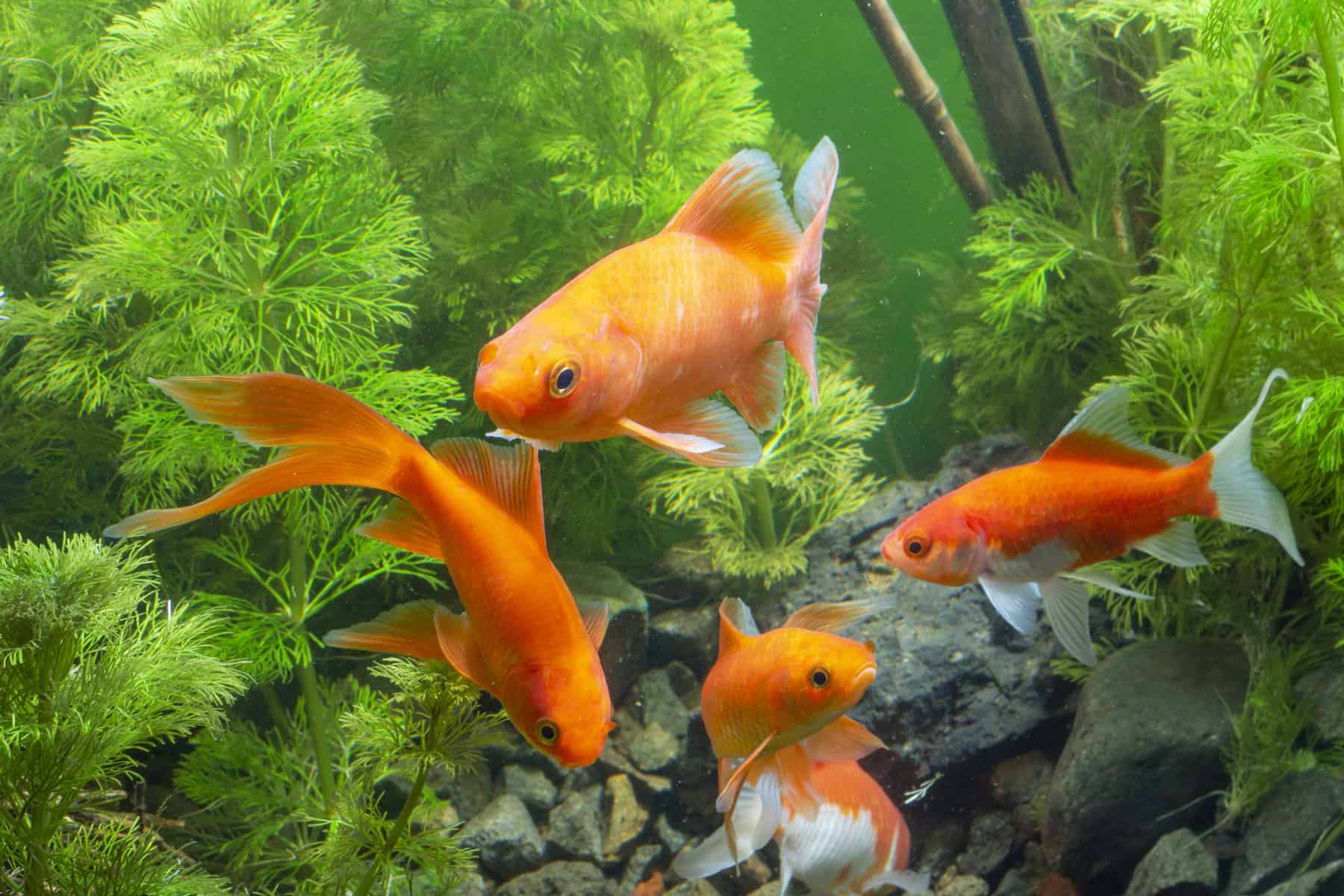
If your goldfish refuses to eat, it could indicate a serious problem, so you must act immediately to identify the issue and resolve it.
Test Your Tank Water
Since poor-quality water is the number one root cause of goldfish appetite problems, your first line of fire is to test your water.
Using an aquarium liquid test kit or test strip, test the water for ammonia, nitrites, and chlorine that could be causing the problem.
Removing Ammonia From The Goldfish Tank
If your water tests reveal an ammonia spike, you need to act immediately to rectify it. Make an emergency water change by swapping out 40% of the aquarium water with treated tap water. Continue to make 20% partial water changes every day until you’ve identified and corrected the root cause of the problem.
Ensure your biological filter is working properly to convert ammonia into nitrates and make sure that you’re keeping on top of your aquarium maintenance and hygiene such as regularly vacuuming your gravel and avoiding overfeeding.
Removing Chlorine or Soap
If you’ve forgotten to treat your tap water with a dechlorinating agent, you need to act fast by adding a water conditioner such as Seachem Prime to your fish tank. It could save your goldfish’s life.
- POWERFUL TREATMENT: Seachem Prime is a complete and concentrated conditioner for both freshwater and saltwater fish tanks, working hard to remove chlorine and chloramine.
- USE: Use 1 capful (5 mL) of Seachem Prime for each 200 L (50 US gallons) of new or replacement water.
- SAFETY: In case of an emergency, the 5x dose of Seachem Prime may be used for both ammonia and nitrite.
If you’ve made the mistake of using any kind of soap product or detergent on or near your fish tank, the bad news is that it’s much more difficult to remove than chlorine.
If there is significant soap residue in your tank, the only way to remove it is to temporarily place your goldfish in another tank or container while you thoroughly wash the main tank with several changes of water.
Check for Disease Symptoms
Check your fish over for symptoms of disease. Red gills, rapid breathing, bloated stomach, swimming difficulties, ragged fins, and unusual marks or patches on the skin are all signs that your goldfish could be suffering from an infection or ailment.
Use our health and diseases pages to help you diagnose and treat health conditions, or alternatively, take your goldfish to a qualified vet.
Reduce Stress
If your tank’s water seems to be in good condition and you can’t identify any illness in your goldfish, see if you can determine any stress factors in your tank. Is your tank large enough, with compatible tank mates, correct lighting, and a suitable and stable water temperature?
If you can improve any of these factors, your goldfish may well begin to feel better and resume their normal diet.
Change Their Food
Finally, if there don’t seem to be any other problems with your fish or tank setup, your aquatic pet might simply be asking you to change its diet!
If your goldfish isn’t eating your regular dried goldfish food, you could try feeding it live or frozen foods such as bloodworms, tubifex worms, daphnia, brine shrimp, mosquito larvae, and mysis shrimp.
Goldfish also enjoy some plant matter in their diet, so you could also try offering them shelled garden peas and some leafy greens.
As always, remove any food that your goldfish hasn’t eaten within 3-5 minutes.
Goldfish Not Eating in a Garden Pond
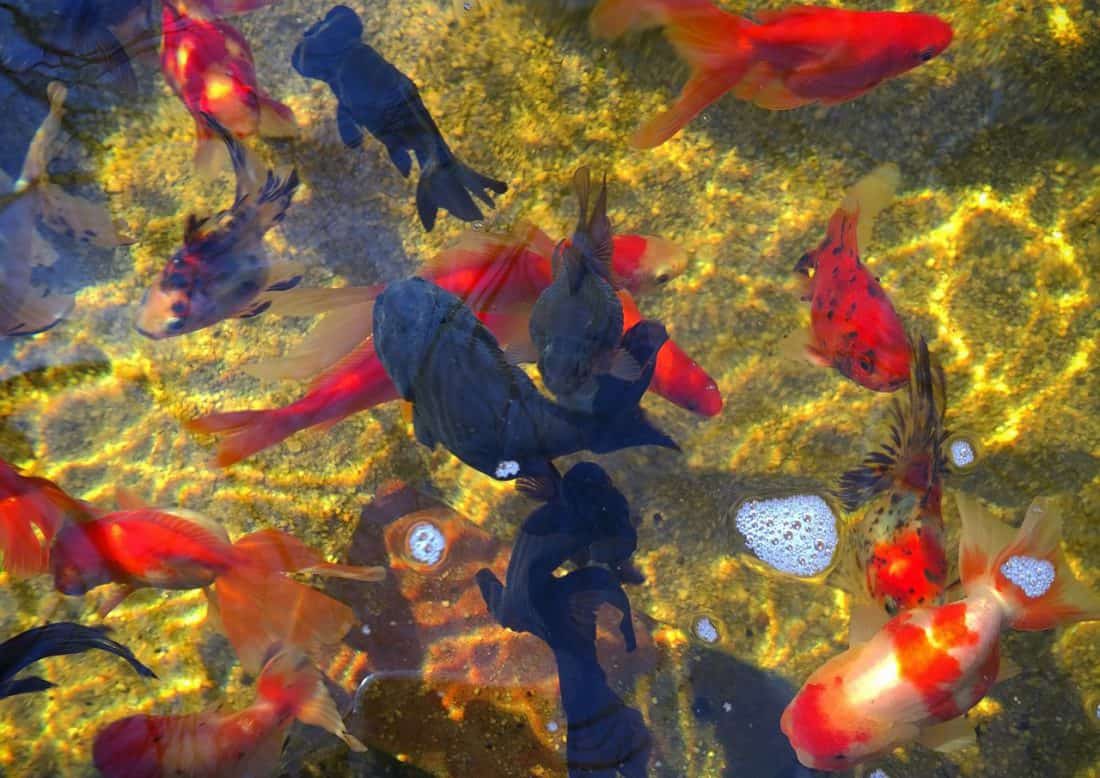
Please bear in mind that all of my above suggestions refer to goldfish kept in fish tanks. When kept in ponds, goldfish will have very different eating habits.
Because ponds are natural ecosystems that contain a variety of plants and invertebrates to feed your goldfish, they may lose interest in eating goldfish pellets if they’re finding plenty of food elsewhere.
Additionally, your goldfish’s diet will change considerably over the course of the year. During spring and summer, your pond goldfish may eat voraciously as they try to fatten up. But during winter in colder climates, goldfish will more or less hibernate and eat very little at all.
How Many Days Can My Goldfish Live Without Food?
A fully-grown, healthy goldfish may be able to last up to 15 days without food, but it wouldn’t be very good for them! If they’re forced to live without food, goldfish will use proteins stored in their liver to metabolize and stay alive.
Some goldfish keepers like to fast their goldfish for one day every week or every month, but there are mixed opinions about whether it’s truly beneficial for their health. Fasting is, however, a broadly accepted practice for aquarium fish suffering from bloat, constipation, and dropsy.
Can My Goldfish Die From Not Eating?
If your goldfish don’t eat for more than a few days, it will begin to use up its energy reserves and get weaker. After a week, its condition could become serious, and with continued deprivation of food, death would eventually be inevitable.
Conclusion
If your goldfish stops eating, it might well indicate a serious problem in either your goldfish’s tank environment or health that needs identifying and treating as quickly as possible.
I hope that the suggestions made in this article can help you get your goldfish eating and back to full health again.
To find out more about goldfish care, including their proper feeding regime, check out our dedicated guide here.

